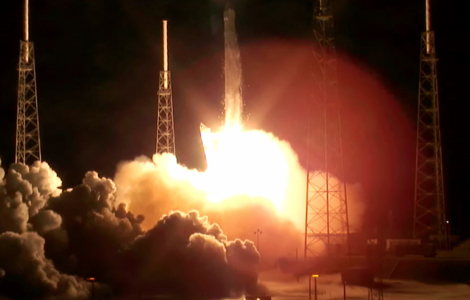This Ain’t No Shuttle Launch
Passing the baton at Cape Canaveral.
Driving through the NASA Kennedy Space Center gate last Saturday for the first attempt at launching SpaceX’s Falcon 9 rocket, I noted the light traffic compared to the bumper-to-bumper scenes of the past. “Man, this ain’t no shuttle launch,” I said to the guard at the gate. “What shuttle?” he answered. “I was laid off a year ago.”
He was smiling, but not kidding. At Cape Canaveral, many are still resentful about the end of the shuttle program, or the lack of something big enough to replace it. And there’s a bit of envy directed at the young upstarts from California.
Robert Pearlman of collectSPACE got it right with his photo of today’s Falcon launch and a shuttle mockup. We’re seeing a historic passing of the baton in the space business.
The giant shuttle launch pads and assembly buildings now sitting silent and empty at the Cape are a monument to human ingenuity, but their day is over. Whether SpaceX will ultimately succeed, technically or economically, remains to be seen. They may not even get through this week without a major setback. And the company payroll of 1,860 people wouldn’t make a dent in the shuttle workforce.
Still, the numbers should grow. Elon Musk certainly believes they will. He talks about helping to set up communities on Mars, which is more than NASA dares to discuss these days. Musk has been known to bad mouth the aerospace establishment, but the SpaceX founder is more tempered in his comments lately, and humbler too (which must be hard when you’re called the Chief Designer and are treated like a rock star). He’s quick to thank NASA for his company’s success, as well he should. The young company and the middle-aged space agency are on this mission (space station resupply) together, and SpaceX benefits daily from NASA’s decades of operational experience, not to mention paying contracts.
SpaceX-bashers who complain that the company is not “truly commercial” raise an irrelevant point. Plenty of American businesses are subsidized or otherwise propped up by the government. And it’s not like taxpayers handed SpaceX a gift. For a modest (by NASA standards) technology investment of $381 million, the agency has incubated a business that everyone agrees is critical to operating the space station. Dragon cargo service will cost less than other options, and come online faster. What’s the down side?
If space travel has a future as a large-scale enterprise, companies like SpaceX are now creating it. Not all the people who worked on the shuttle will get a chance to work on the New Thing, which is a shame, because they did good work. But their teenage children might.
